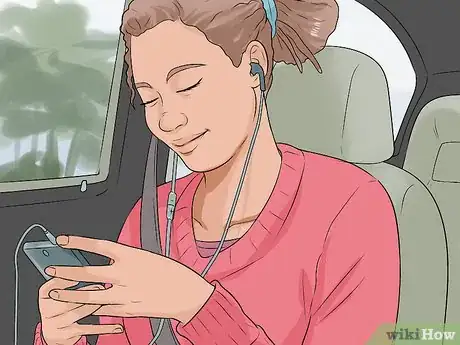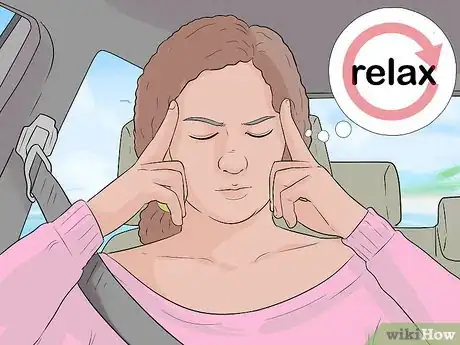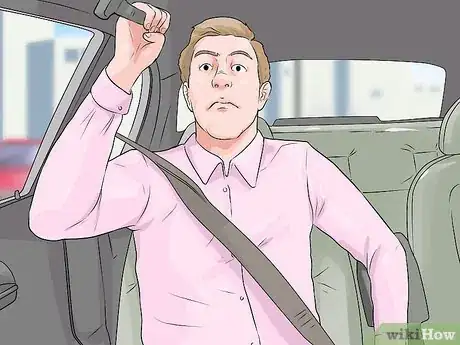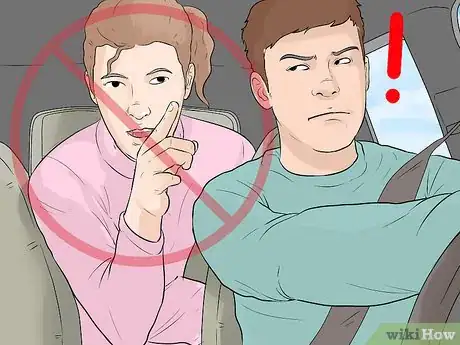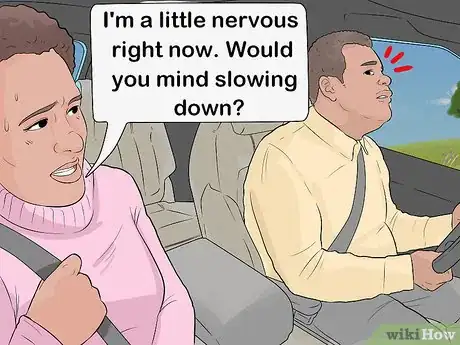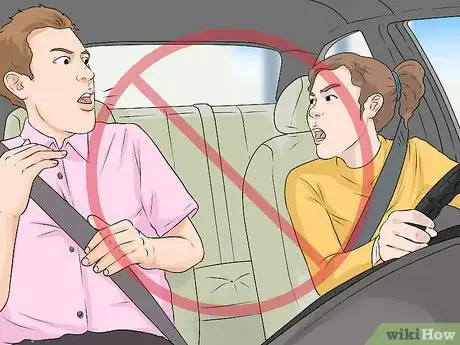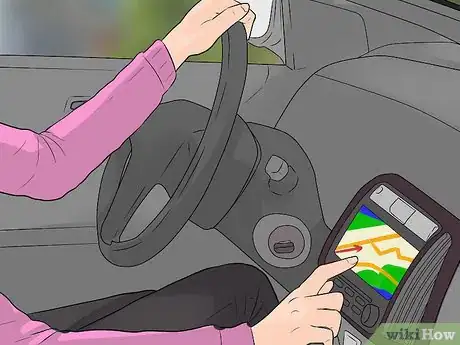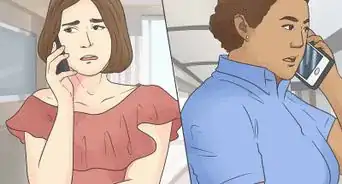This article was co-authored by Casey Lee. Casey Lee is a Licensed Professional Counselor and Founder of Rooted Hearts Counseling LLC. With over a decade of experience, he specializes in facilitating growth and healing through co-creating safe and secure connections with couples. Casey holds an MA in Clinical Counseling from Columbia International University and is certified in Emotionally Focused Therapy (EFT) which he uses with all his couples. He is also a Level 2 Accelerated Experiential Dynamic Psychotherapist (AEDP) Therapist and a Level 1 trained Sensorimotor Psychotherapy Therapist. Casey is a member of the International Center for Excellence in Emotionally Focused Therapy, the National Board of Certified Counselors, and an affiliate member of the American Association of Marriage and Family Therapy.
There are 11 references cited in this article, which can be found at the bottom of the page.
This article has been viewed 40,862 times.
If you feel stressed, anxious, or scared while your partner is behind the wheel, you do not have to suffer. There are ways to keep calm and reduce anxiety during the trip. If your partner is acting dangerously, let them know how their driving is affecting you. There are also different methods to reduce their stress while they are driving. That said, if you ever feel as though your life is in danger, do not continue letting your partner drive.
Steps
Remaining Calm in the Car
-
1Take deep breaths. If your partner is speeding or weaving through traffic, try to control your nerves through deep breathing. When you breathe, let the air go deep into your lungs so that it fills your diaphragm; your stomach should extend as you do so. Slowly exhale.[1]
- If you are having difficulty remaining calm, try closing your eyes and counting out ten breaths.
-
2Distract yourself. Looking out at how your partner is speeding through traffic might cause anxiety. When sitting in the car, try to focus on something other than the road. Use these distractions to take your mind off of their driving.[2] You can:
- Check the news or your social media on your phone. You can also play a game.
- Keep a stress ball in the car, and squeeze it when you are nervous.
- Look out the passenger side window instead of the windshield.
Advertisement -
3Tense and relax your muscles. Tensing your muscles can actually give you more control over your nerves. Tense up every muscle in your body, including your legs, arms, and shoulders. Once you are fully tensed, hold this pose for a second before slowly relaxing, muscle by muscle.[3]
-
4Repeat positive mantras. Even if your partner is an aggressive driver, they may be a skilled or even safe driver. To relieve your fears, try reminding yourself quietly that everything will turn out fine. Think these statements silently in your mind so that you do not worry or upset your partner.[4]
- For example, you might repeat in your head, “Everything will be alright. We’ll get there safely.”
- You might also try saying, “Relax. It’s just some bad traffic. You can get through this.”
-
5Signal if you are scared. Your partner and you should work out a signal that you can use when you are scared. This signal will indicate that their driving is worrying you without sounding like you are criticizing them. This can encourage them to back off or slow down during aggressive periods.[5] Some signals you might consider include:
- Gripping the safety handle.
- Tapping on the center console.
- Exhaling loudly out of your mouth.
-
6Avoid backseat driving. While you may want to tell your partner to slow down or use their turn signal more often, these statements can be misconstrued as criticisms or backseat driving. This could cause a fight, which might distract the driver and cause an incident.
Talking to Your Partner
-
1Pick your battles. There are some situations when you should point out your partner’s aggressive driving and other times when you might want to leave it alone. If your partner is not posing danger to you or other passengers in the car, just try to remain calm. But if you feel unsafe or threatened by their driving, speak up.[6]
- For example, you might not want to argue about how they stole a parking spot, but you should point out if they nearly hit another driver.
-
2Tell them that you are scared. Instead of criticizing their driving or telling them how to drive, inform your partner how their driving makes you feel. Tell them if you are nervous, scared, anxious, or worried about their driving habits.
- If possible, start the conversation showing appreciation to your partner for driving. Instead of starting complaining about what they are doing, simply share how you feel.
- When we are scared, it's normal to either fight, flight, freeze, or fawn. Do your best to express to your partner how their actions link to how you feel in yourself with clarity.
- You might say, “I’m a little nervous right now. Would you mind slowing down?”
- You might also try stating something like, “That sudden turn back there startled me.”
- Try to end the conversation saying something like, "I know you may not see it the same way but I really need your help in this."
-
3Ask them why they are driving so aggressively. If you think your partner is distracted or upset about something, confront them. Ask them why they are so aggressive on the road. It may cause them to think about their driving habits more carefully.
- You might say, “Is there something bothering you?”
- You might also state, “Is there a reason why you’re getting mad at the other drivers?”
-
4Remind them that time is unimportant. Your partner may be stressed about driving in traffic or arriving late. In a gentle tone, reassure them that you will still arrive at your destination. You might reinforce that being late doesn't matter to you.
- You might say, “Try not to worry about the time. We’ll get there when we get there.”
- If you have reservations or an appointment somewhere, offer to call ahead to let them know you will be late. You can also call friends or family members that you’re meeting.
-
5Avoid arguing. Arguing in the car can make the driver angrier or more distracted. If you feel as though an argument is brewing, try to drop the subject until the driver has parked.[7]
- After the drive, you might say, "Hey, can we talk about what happened on the road today?"
Preventing Bad Situations
-
1Offer to drive. If your partner’s driving consistently makes you upset, offer to drive when you two are together. By taking control of the situation, you can reduce your anxiety and protect yourself.[8]
-
2Leave early. Leave at least ten minutes earlier to give yourselves more time if there is a traffic jam, long lights, trains, or other delays. This might reduce the driver's stress, and it may decrease their road rage.[9]
-
3Plan your route ahead of time. If you are going somewhere new, look up directions ahead of time to avoid getting lost. Even if you are using a GPS, this can be useful to help you navigate, and it will help reduce stress in the car. If there are multiple routes to the place you are going, look up the fastest route.[10]
- Use Google or Apple Maps to trace the fastest route to your destination.
- If you are going somewhere with a website, check it for information about parking, traffic, and landmarks.
- If you are traveling on a highway or major road, you may want to look up traffic reports before you leave to see if there are any delays.
-
4Talk to a therapist. If your anxiety is becoming severe or if you are having panic attacks while your partner drives, you may want to speak to a therapist. There are many different types of behavioral therapy that can help you cope with your passenger anxiety.[11]
- Cognitive Behavioral therapy can be used to teach how to safely deal with your anxiety while in the car.
- Exposure therapy will put you in similar situations so that you can desensitize yourself to your partner’s driving.
- If you have anxiety as a passenger in the car, bus, subway, or other vehicles, no matter who is driving, you may have amaxophobia. This phobia may cause anxiety, panic attacks, or extreme fear when you are riding as a passenger.[12]
-
5Stop riding with them. If your partner is a dangerous or unsafe driver, do not get in the car with them. You are under no obligation to let them drive you places. Either take different cars or offer to be the driver.[13]
- Never get in the car if your partner is drunk or under the influence of drugs.
- If you have children, consider whether or not you feel safe with them in the same car as your partner.
- You should let your partner know that they need to change. You can say, “When we drive together, I feel scared and unsafe because of how aggressive you become. I am worried we will get into an accident one day. From now on, I want to drive.”
Expert Q&A
-
QuestionHow do I talk to my partner about road rage?
 Casey LeeCasey Lee is a Licensed Professional Counselor and Founder of Rooted Hearts Counseling LLC. With over a decade of experience, he specializes in facilitating growth and healing through co-creating safe and secure connections with couples. Casey holds an MA in Clinical Counseling from Columbia International University and is certified in Emotionally Focused Therapy (EFT) which he uses with all his couples. He is also a Level 2 Accelerated Experiential Dynamic Psychotherapist (AEDP) Therapist and a Level 1 trained Sensorimotor Psychotherapy Therapist. Casey is a member of the International Center for Excellence in Emotionally Focused Therapy, the National Board of Certified Counselors, and an affiliate member of the American Association of Marriage and Family Therapy.
Casey LeeCasey Lee is a Licensed Professional Counselor and Founder of Rooted Hearts Counseling LLC. With over a decade of experience, he specializes in facilitating growth and healing through co-creating safe and secure connections with couples. Casey holds an MA in Clinical Counseling from Columbia International University and is certified in Emotionally Focused Therapy (EFT) which he uses with all his couples. He is also a Level 2 Accelerated Experiential Dynamic Psychotherapist (AEDP) Therapist and a Level 1 trained Sensorimotor Psychotherapy Therapist. Casey is a member of the International Center for Excellence in Emotionally Focused Therapy, the National Board of Certified Counselors, and an affiliate member of the American Association of Marriage and Family Therapy.
Licensed Professional Counselor (LPC) Thank them for driving and focus on how their driving makes you feel (rather than just accusing them). You might say "I appreciate you driving. I want you to know that I get really scared when you get road rage while driving. I feel very anxious inside, my gut tightens up, my mind starts racing, and I have a hard time breathing. It would really help me to feel safer and calmer inside if you weren't so vocal with other drivers."
Thank them for driving and focus on how their driving makes you feel (rather than just accusing them). You might say "I appreciate you driving. I want you to know that I get really scared when you get road rage while driving. I feel very anxious inside, my gut tightens up, my mind starts racing, and I have a hard time breathing. It would really help me to feel safer and calmer inside if you weren't so vocal with other drivers."
Warnings
- Differences in driving styles can cause arguments and tension in couples. Always communicate in a non-accusing way. Focus on how you feel rather than what they are doing wrong.⧼thumbs_response⧽
References
- ↑ http://www.airlinetraveladvice.com/fear.shtml
- ↑ https://anxieties.com/91/flying-step6
- ↑ http://www.airlinetraveladvice.com/fear.shtml
- ↑ https://anxieties.com/91/flying-step6
- ↑ http://www.nytimes.com/2002/10/23/automobiles/road-rules-to-have-and-to-hold-till-driven-apart.html
- ↑ http://www.nytimes.com/2002/10/23/automobiles/road-rules-to-have-and-to-hold-till-driven-apart.html
- ↑ http://www.nbcnews.com/business/consumer/survey-reveals-what-we-already-knew-we-can-t-stand-n673346
- ↑ http://www.nytimes.com/2002/10/23/automobiles/road-rules-to-have-and-to-hold-till-driven-apart.html
- ↑ https://www.webmd.com/women/features/root-cause-of-road-rage

